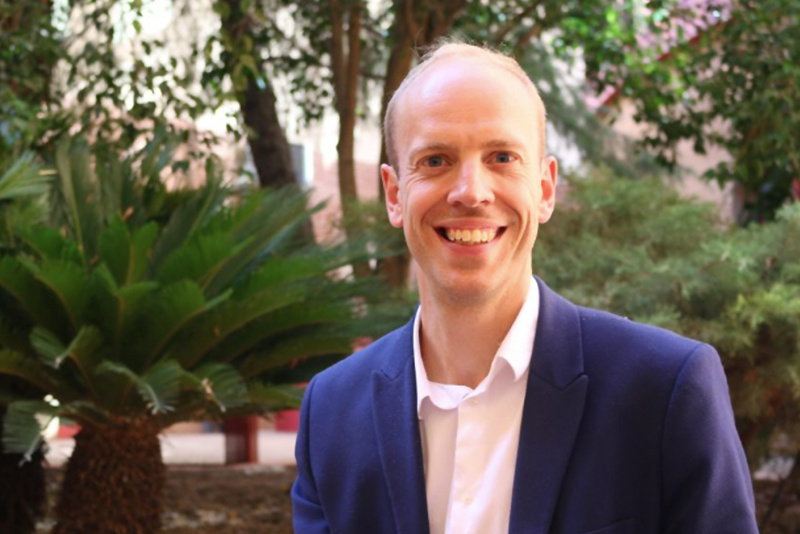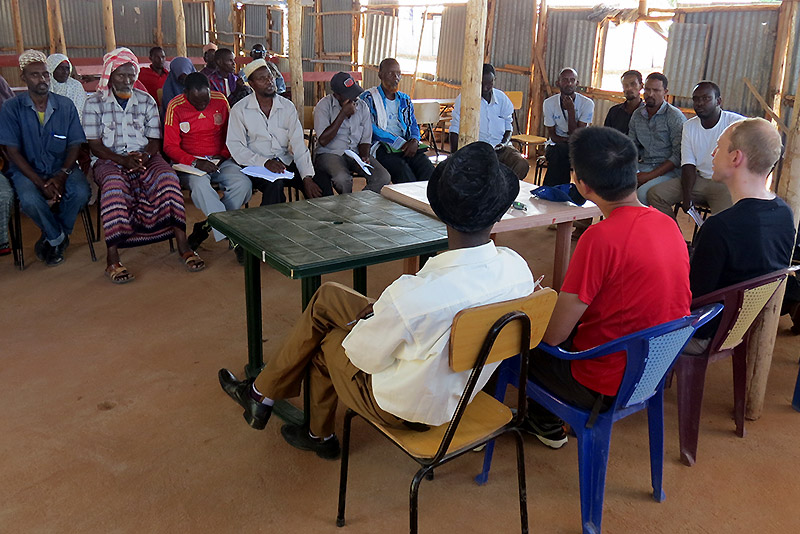Changing the narrative on refugees
The perception of refugees is all too often of them being a burden on society. On the contrary, they have a great deal to offer their host communities, says Professor Alexander Betts, who is working to change refugee policies for the better.
Stories of the extraordinary challenges encountered by refugees – fleeing war, natural disaster or political oppression – often paint a one-dimensional picture at odds with the complex reality of their displaced daily lives. Alexander Betts, Professor of Forced Migration and International Affairs at the University of Oxford, has dedicated his career to changing that narrative.
Professor Betts’ interest in refugee economies began when, as a 19-year-old economics student, he spent a summer volunteering at a reception centre for asylum seekers and refugees in the Netherlands. ‘I met a lot of inspiring people with skills and talents from around the world,’ he says. ‘A Bosnian lawyer taught me the basics of public international law, an Iranian Olympian taught me table tennis. The real tragedy for me was they weren’t allowed to work or contribute. They were stuck indefinitely in bureaucratic limbo.’
 Professor Alex Betts
Professor Alex Betts
Fast forward and Professor Betts now leads the Refugee Economies Programme at Oxford, which seeks to create more sustainable refugee policies in order to improve the welfare of individual refugees, support social cohesion within their host communities, and better understand the reasons behind migration and residency choices.
The scale of the work at hand, enabled by a generous donation from the IKEA Foundation, is vast. It covers the capital cities of Kenya, Uganda and Ethiopia, plus one refugee camp in each of the three countries, following 16,000+ refugees and host community members over time. An interdisciplinary team at Oxford runs the programme with the help of crucial national research coordinators.
Professor Betts says: ‘We have trained over 200 refugees and members of the host communities in basic social science research methods, enabling them to work with us as research assistants and enumerators. They play a very important mediating role between us as outsiders and the research subjects that we study. Then, through focus groups and interviews, we can really get to know and understand the communities on their own terms, building in-depth relationships and trust with the refugee and host communities and working across language and cultural barriers.’
‘The refugee challenge is not just about providing for immediate humanitarian needs, but is also about long term development, giving people the opportunity to lead meaningful and purposeful lives, to have access to education and employment opportunities’
The training and the work carried out by the researchers have an important legacy in their own right: many researchers have gone on to work on projects for other universities or international bodies; set up their own organisations; or pursued further study at university. ‘It has been very gratifying to be able to follow their career trajectories,’ says Professor Betts.
The most obvious audiences of the programme’s outputs are international organisations like the UN Refugee Agency, international NGOs and the governments that fund them. But other key targets include the business sector, because investment is essential to create sustainable livelihood and employment opportunities for refugees; and, increasingly, the refugees themselves. Professor Betts explains: ‘Refugees are economic actors. They are entrepreneurs, producers, consumers, borrowers, lenders. Our work can help them understand the economies that they’re part of.’ On this premise, the team published some of its research in the Somali language for those in refugee camps in southern Ethiopia last year, enabling them to use the research that they’d been part of producing to inform their understanding of the opportunities available to them.
Professor Betts is acutely aware of the power of communication to improve public understanding of the key issues. ‘It has been very important for me to talk about our research on platforms like TED, through the media, on the BBC, on CNN, through newspapers such as the Guardian and the New York Times, and also to speak at the World Economic Forum in Davos.’
As well as conducting its own research, the team evaluates innovative practices being employed elsewhere in the sector, such as how private sector investment might create sustainable livelihood opportunities through cooperative models; or how using particular types of cash transfer systems for refugee communities could help with food assistance.
 A focus group discussion with refugee leaders in Dollo Ado, Ethiopia
A focus group discussion with refugee leaders in Dollo Ado, Ethiopia
Even if the team is able to identify what works, however, politics still determine whether or not those policies will be implemented. Professor Betts says: ‘In Uganda, Kenya and Ethiopia, we have tried to understand what has shaped government choices. Why is it that Uganda has historically allowed refugees the right to work and freedom of movement, while Kenya has insisted that all refugees live in refugee camps? That matters because it can inform how we influence government practice. And it is important for businesses to engage, because if refugees don’t have the right to work, businesses can’t employ them or create entrepreneurship opportunities for them.’
Outputs of the Refugee Economies Programme have already influenced refugee policy in a range of countries around the globe, from regions of east Africa to Colombia. Professor Betts says: ‘I worked with the government of Jordan on a project to create the right to work for Syrian refugees there. One outcome of that was the distribution of work permits to over 180,000 Syrian refugees in a country where previously they didn’t have the right to work.’
With summer school bursaries for those from the global south, including refugees, and a Junior Research Fellowship in International Relations at Lady Margaret Hall also being funded by the IKEA Foundation as part of this gift, Professor Betts feels sure that Oxford’s expertise and influence in this area will continue to grow. He says: ‘This gift is a long-term commitment to supporting researchers and practitioners, connecting the research we do to teaching opportunities both through our degrees and our outreach programmes like the summer school. If we’re looking at ways in which our work has impact, that is an important one.’
For further information about this research, please visit the Refugee Economies website. A new book based on the research – The Wealth of Refugees: How Displaced People Can Build Economies – has now been published by Oxford University Press.
SUPPORT THE REFUGEE STUDIES CENTRE